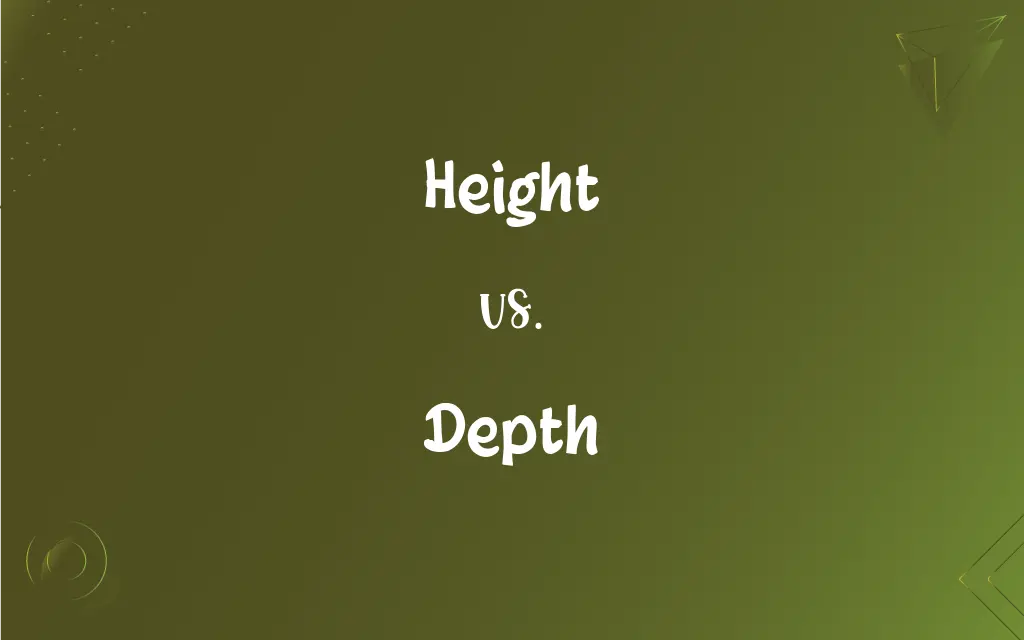Height vs. Depth: What's the Difference?
Edited by Aimie Carlson || By Harlon Moss || Updated on July 10, 2024
Height refers to the measurement from base to top or head to foot, while depth indicates the distance from the top or surface to the bottom inwardly.

Key Differences
In a thorough examination, height and depth might initially seem like similar concepts, but they possess distinct spatial definitions and applications. Height refers to the measurement of someone or something from head to foot or from base to top. For example, when one talks about the height of a person, we reference the distance from the feet to the top of the head. Conversely, depth tends to refer to the distance down from the top surface of something to its bottom, often in a downward and inward direction. When considering the depth of a pool, it signifies the measurement from the water surface down to its bottom.
Height is universally applicable in various contexts, embodying not only the physical dimensions of objects but also metaphorical application, such as in a career’s "height". Depth, while also adaptable to numerous contexts, often leans more into discussions involving the profundity or profoundness of subjects, like in conversations or philosophical discourses, thus it could be metaphorically utilized as well. The concept of depth can imply complexity, intensity, and profoundness in certain contexts.
There's also a distinct directional component to both height and depth that is key to their differentiation. Height is typically measured vertically, but always upward from the base of an object or subject. For example, one might ask about the height of a tree, wanting to know the distance from the base at the trunk to the treetop. Depth, while also a vertical measurement, is oriented downward from the surface level. When asking about the depth of a lake, the implication is to find out how far it is from the surface to the bottom.
In geometry or mathematics, height and depth hold rigid, physical implications, where the focus is largely on literal, physical measurements and spatial orientation. Height is a determinant in calculating area, surface area, and volume in various shapes and forms. While depth is equally significant in computations, particularly when deliberating three-dimensional objects, providing understanding about the ‘deepness’ of a particular entity, like how deep a box or a container is.
While the employment of "height" and "depth" may sometimes intersect, especially in casual conversations, maintaining an awareness of their distinct, nuanced applications allows for precise and accurate communication, especially in technical, academic, or professional contexts.
ADVERTISEMENT
Comparison Chart
Basic Definition
Measurement from base to top or head to foot
Distance from the top or surface to the bottom inwardly
Direction
Measured upwards
Measured downwards
Contextual Usage
Can denote altitude or stature
Often indicates the profundity or deepness of something
Metaphorical Usage
Can indicate peak or pinnacle (e.g., height of a career)
Can signify profundity or intensity (e.g., depth of emotion)
Dimensionality
Is used to describe one-dimensional vertical measurement
Is often used to describe the inward measurement of an object
ADVERTISEMENT
Height and Depth Definitions
Height
Height refers to the measurement of an object or person from base to top.
The height of the mountain is daunting to novice climbers.
Depth
In a psychological or emotional context, depth can refer to the complexity or profundity of feelings or thoughts.
His depth of sorrow was palpable in his writings.
Height
In a figurative sense, height can denote the pinnacle or peak of something, such as an event or career.
At the height of her career, she was unbeatable.
Depth
Depth refers to the vertical distance from the top or surface of something to its bottom.
The depth of the lake remains a mystery to locals.
Height
Height is utilized in various calculations in mathematics, like determining the area of a triangle.
To find the area, multiply the base of the triangle by its height and divide by two.
Depth
In a color context, depth refers to the intensity or richness of a shade or tone.
The depth of the blue in the painting draws the viewer’s attention.
Height
Height may also depict the degree of development or achievement in a certain context.
The building is a symbol of the height of architectural innovation in the modern era.
Depth
In sports, depth can refer to the quality and number of substitute players a team has.
The coach relied on the team’s depth to navigate through the injury crisis.
Height
In geography, height can also refer to the elevation of a geographical location above a specific level, usually the sea level.
The city is popular among athletes for training due to its high height above sea level.
Depth
Depth in a discussion or topic refers to the level of detail or comprehensiveness with which it is explored.
The depth of the research provided insights into historical events.
Height
Abbr. h The distance from the base of something to the top.
Depth
The condition or quality of being deep.
Height
Elevation above a given level, as of the sun or a star above the horizon; altitude.
Depth
The extent, measurement, or dimension downward, backward, or inward
Dove to a depth of 30 feet.
Shelves with enough depth to store the large boxes.
FAQs
Is height always measured vertically?
Yes, height is a vertical measurement, typically from base to top.
What does depth describe?
Depth describes the vertical distance from the top or surface of something to its bottom.
Can height refer to things other than physical measurement?
Yes, height can metaphorically depict peaks or maxima in various contexts.
Can depth be used to describe colors?
Yes, depth can describe the intensity or richness of a color.
What is "depth of field" in photography?
It refers to the distance between the nearest and farthest objects that are in focus.
What does "depth of knowledge" mean?
It refers to a comprehensive and profound understanding of a subject.
What does height refer to?
Height refers to the measurement from base to top or from head to foot.
What does "height above sea level" mean?
It refers to the elevation of a location relative to the sea's level.
How is height used in mathematical calculations?
Height is used in various formulas to calculate areas, volumes, and more.
Can depth refer to levels in a hierarchy?
Not typically, depth usually pertains to downward measurement or complexity.
How does depth relate to emotion?
Depth can describe the intensity or complexity of an emotion or feeling.
What does "depth in research" imply?
It implies thoroughness and detail in exploring a topic or subject.
Is height only applicable to physical entities?
No, height can also describe immaterial and metaphorical ascents or peaks.
How is depth used in a sports context?
Depth refers to the quality and quantity of substitute or backup players a team possesses.
Can height refer to elevations in geographical contexts?
Yes, height can describe the elevation of geographical points.
Do height and depth always have physical connotations?
No, both terms can be used in various contexts, including metaphorical ones.
Does depth always pertain to physical distance?
No, depth can also refer to the complexity or profundity in various contexts.
Is the depth of a container measured inward?
Yes, depth measures the distance from the top surface inward to the bottom.
Are depth and width synonymous?
No, while depth measures top-down distance, width pertains to side-to-side measurement.
Can height be metaphorically applied in a career context?
Yes, one might speak of the "height of a career" to mean its peak or apex.
About Author
Written by
Harlon MossHarlon is a seasoned quality moderator and accomplished content writer for Difference Wiki. An alumnus of the prestigious University of California, he earned his degree in Computer Science. Leveraging his academic background, Harlon brings a meticulous and informed perspective to his work, ensuring content accuracy and excellence.
Edited by
Aimie CarlsonAimie Carlson, holding a master's degree in English literature, is a fervent English language enthusiast. She lends her writing talents to Difference Wiki, a prominent website that specializes in comparisons, offering readers insightful analyses that both captivate and inform.































































